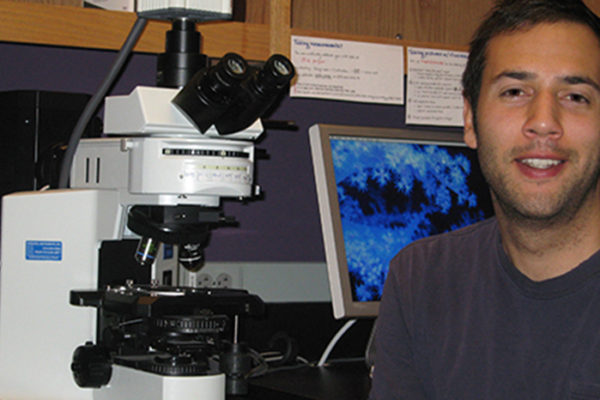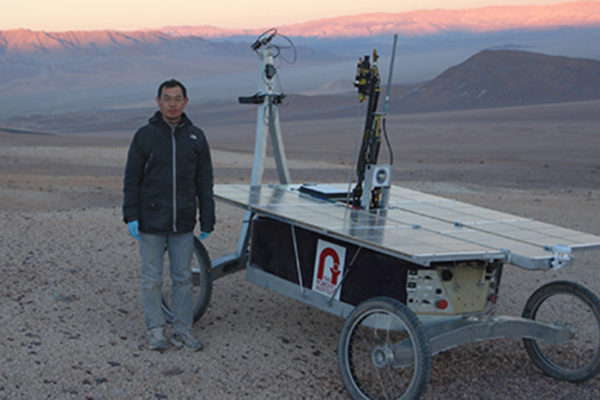Creating plants that make their own fertilizer
Much of modern agriculture relies on biologically
available nitrogenous compounds (called “fixed” nitrogen) made by an
industrial process developed by German chemist Fritz Haber in 1909. Himadri Pakrasi, PhD, a scientist at Washington University in St. Louis, thinks it should be possible to design a better
nitrogen-fixing system. His idea is to put the apparatus for fixing
nitrogen in plant cells, the same cells that hold the apparatus for
capturing the energy in sunlight. The National Science Foundation just awarded Pakrasi and his team $3.87 million to explore this idea further.
Green Rehab project promotes a more sustainable university
An interdisciplinary team of researchers and
students from the School of Engineering and Applied Science, the Sam Fox
School of Design & Visual Arts and Olin Business School at
Washington University in St. Louis is working to create a more sustainable future for the university. Over
the last year, teams have developed an experimental framework for
testing environmentally friendly redevelopment strategies in a group of
University-owned apartment buildings north of the Delmar Loop.
WUSTL bucks global trend in female entrepreneurship
A recent report from the Global Entrepreneurship Monitor indicates that there are significantly fewer female entrepreneurs than male entrepreneurs around the world. This is not the case, however, at Washington University in St. Louis, where more than 40 percent of successful companies started by recent graduates through the university’s business
entrepreneurship courses have been founded by women.
Lab-made complexes are “sun sponges”
In the Aug. 6, 2013, online edition of Chemical Science, a team of scientists describes a testbed for light-harvesting antennas, the structures that capture the sun’s light in plants and bacteria. Prototype designs built on the testbed soak up more of the sun’s spectrum and are far easier to assemble than synthetic antennas made entirely from scratch. They offer the best of both worlds, combining human synthetic ingenuity with the repertoire of robust chemical machinery selected by evolution.
Frédéric Moynier awarded 2013 Kuno Prize
Frédéric Moynier, PhD, associate professor of earth
and planetary sciences in Arts & Sciences, has been named the
recipient of the 2013 Hisashi Kuno award given by the American
Geophysical Union.
The award is given annually to recognize the scientific
accomplishments of junior scientists who make outstanding contributions
to the fields of volcanology, geochemistry and petrology.
Remembering to remember supported by two distinct brain processes
New research from Washington University in St. Louis sheds light on the brain mechanisms that underlie a type of memory, known as prospective memory, revealing two distinct processes that support our ability to remember to remember.
Brain’s flexible hub network helps humans adapt
New research from Washington University in St. Louis offers compelling evidence that a well-connected core brain network based in the lateral prefrontal cortex and the posterior parietal cortex — parts of the brain most changed evolutionarily since our common ancestor with chimpanzees — contains “flexible hubs” that coordinate the brain’s responses to novel cognitive challenges.
Protein that delays cell division in bacteria may lead to the identification of new antibiotics
Bacteria adjust to wide fluctuations in food supply by controlling how big they get and how often they divide. Scientists at Washington University in St. Louis have just worked out the control system E. coli use to delay division so they can bulk up when food suddently becomes abundant. What can be delayed can also be stopped, so the control system may provide an opportunity to design a new class of antibiotics.
Successful dry run for the 2020 Mars Mission
In June, a rover named Zoe
set out into the Atacama Desert on the west coast of South America to test a suite of instruments intended for future missions to Mars under Mars-like conditions. One of the instruments aboard Zoe was a Raman spectrometer designed by a team led by Alian Wang of Washington University in St. Louis. A fragile lab instrument that was ruggidized to survive the desert, the Raman spectrometer is expected to fly on the 2020 Mars mission.
Social amoebae travel with a posse
Some social amoebae farm the bacteria they eat. Now a collaboration of scientists at Washington University in St.
Louis and Harvard University has taken a closer look at one lineage, or
clone, of D. discoideum farmer. This farmer carries not one but two strains of bacteria. One strain
is the “seed corn” for a crop of edible bacteria, and the other strain
is a weapon that produces defensive chemicals. The edible bacteria, the scientists found, evolved from the toxic one.
Older Stories




